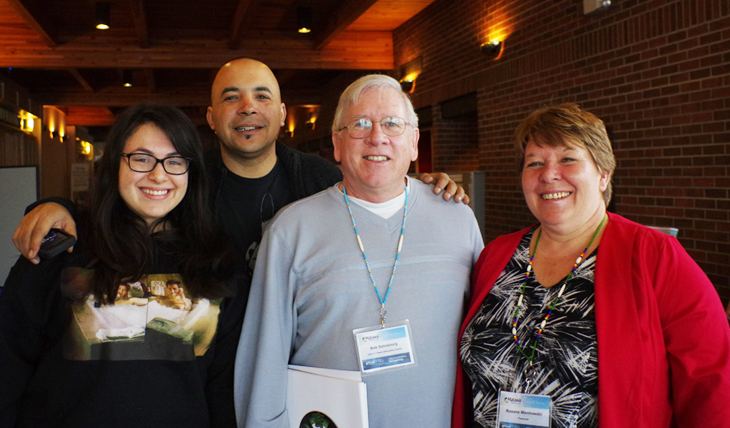ONECA expanding on Aboriginal Student Transitions project

By Rick Garrick
The Ontario Native Education Counselling Association recently shot videos at Lakehead University, Confederation College and Oshki-Pimache-O-Win Education and Training Institute in Thunder Bay.
“We’re expanding on the (Aboriginal Student) Transitions Project that we have done for the last few years,” says Roxane Manitowabi, ONECA’s executive director and citizen of Algonquins of Pikwakanagan. “Our goal is to do virtual tours of all the post-secondary institutions in Ontario and the Aboriginal Institutes Consortium.”
Manitowabi says ONECA wants to provide a tool for counsellors to support their students with virtual tours of Ontario’s post-secondary institutions.
“A counsellor would be able to take a student from any community — they could stay in their community — and take them on a (virtual) tour of the Aboriginal units in any of the post-secondary institutions in Ontario,” Manitowabi says. “That is really important because then they are making that connection, that facial recognition. They are able to see what kind of services that institution has to support them with. So we are creating a cultural space for a student before they even get to a post-secondary institution.”
Manitowabi says the virtual tour will provide students with an introduction to staff before they arrive at the post-secondary institution.
“Even though they’ve never technically met (the staff), they’ve met (them) virtually,” Manitowabi says. “I think that is really important for our students.”
Manitowabi says the virtual tours will also help students who cannot afford to travel to visit the different institutions across the province.
“So we’re creating access for students to those institutions where they might normally not be able to go and visit,” Manitowabi says. “It helps them make their decision on which institution (to attend), based on their services. That is a really big thing with our Aboriginal students; they need those supports.”
Manitowabi says the virtual tours are part of a three-year project that also includes webinars on career planning. ONECA partnered with the Ontario School Counsellors Association on the project.
“A lot of times we see that where students will choose a career and then all of a sudden it’s nothing like they thought it was going to be,” Manitowabi says. “So take a deep look inside yourself — who am I, what are my likes, what are my dislikes. Because that is important for us to do that self-exploration when we are choosing a career. So we are going to have a series of webinars that students will be able to participate with.”
ONECA’s Transitions project supports First Nations, Métis and Inuit students in school and career success. Transitions are defined as the strategies, programs, policies, curriculum and resources that make First Nations, Métis and Inuit (FNMI) student changes seamless between different levels of education as well as between institutions, from post-secondary to home and from school to work.


